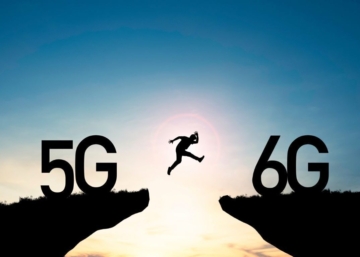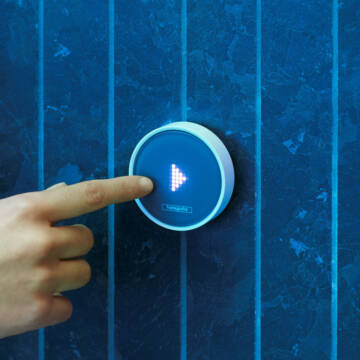Welcome to the world… in 6G

Imagine a teleconference, with holograms instead of a checkerboard of faces. Or digital communication including smell, hearing and touch, in addition to sight and sound. Pure science fiction? Not really. It is what researchers think possible by 2030, through 6G. Today, we are surrounded by digital technologies that make our lives easier. Tomorrow, the immersive experience of 6G will blur the boundaries between the digital and physical world.
Imagine a teleconference, with holograms instead of a checkerboard of faces. Or digital communication including smell, hearing and touch, in addition to sight and sound. Pure science fiction? Not really. It is what researchers think possible by 2030, through 6G. Today, we are surrounded by digital technologies that make our lives easier. Tomorrow, the immersive experience of 6G will blur the boundaries between the digital and physical world.
Imagine a teleconference, with holograms instead of a checkerboard of faces. Or digital communication including smell, hearing and touch, in addition to sight and sound. Pure science fiction? Not really. It is what researchers think possible by 2030, through 6G. Today, we are surrounded by digital technologies that make our lives easier. Tomorrow, the immersive experience of 6G will blur the boundaries between the digital and physical world.
Of course, we are not there yet. Currently, the rollout of 5G is in full swing, and that is already a huge leap from 4G. But what 6G could bring borders on the incredible. Researchers studying the future of sixth-generation (6G) wireless communications, now outline possibilities for those technologies. In their forecasts, 2030 will herald the era of full immersion. But what will that mean in the real world?
Think of sensory interconnection as the main method of communication, widely used in medical and healthcare, skills learning, entertainment, road transport, etc. Multisensory extended reality (XR) will be combined with next-generation networking, Quantum computing, cloud computing, big data, AI and other technologies. In this way, more and more personal and home appliances, city sensors, unmanned vehicles, smart robots, etc., will become new types of smart terminals and enable three-dimensional communications, including all five senses of sight, hearing, smell, taste and touch.
The mobile phone of the future network will be intelligent enough to sense the environment and take precautionary measures. Such as detecting air pollution, toxic food and explosive materials in our environment. They will replace wallets, hard cash and wristwatches. Seeing through walls by receiving signals from multiple levels of density nearby? Check!
In addition, 6G mobile phones will be able to provide position, location and range with extremely high accuracy. Self-driving cars, already in the early stages of development today, would make human life safer and more comfortable.
Will 6G be the doorway to a new world? And if so, what implications are to be considered on the ethical level?
Today, 5G makes its appearance as the latest generation of mobile networks. The jump from 3G to 4G networks was big - 4G to 5G is many times bigger and 6G is almost impossible to comprehend.
The most obvious difference is speed. 6G wireless technology will be characterised by extremely low latency time of less than one millisecond and by extremely high frequency (EHF) spectrum, with data transfer rates as high as 100 Gbps. Allowing to handle a much greater volume and diversity of radio waves than 5G, 6G will be able to deliver global, integrated intelligence as mentioned above.
In terms of coverage, 6G will become universal. 6G satellite technology and intelligent surfaces that can reflect electromagnetic signals will provide low-latency, multi-gigabit connectivity. This is especially transformative for parts of the world where conventional mobile networks have so far been too difficult or expensive to reach. Remote parts of the world, the skies and oceans could all be connected.
And last but not least, 6G will be more efficient than its predecessor and consume less energy. Energy efficiency is critical for a more sustainable mobile industry because of the expected exponential growth in Data generation.
6G will enable AI devices to establish new, effectively endless network connections in less than a millisecond. Through 6G networks, these smart devices can realise ultra-efficient simulation and prediction of the operation and development of the physical world by continuously learning, communicating, collaborating, making the optimal decisions.
6G development is still in the early stages of research. It is expected that 3GPP 6G technology pre-research and international standardisation will start after 2025. As 6G moves to terahertz frequencies, there will also be huge challenges in building new hardware. Better semiconductor technologies will be needed for faster devices. Other challenges, such as power consumption, also remain.
One thing is for certain: the digital revolution has changed the way we live, talk or work. Will 6G be the doorway to a new world? And if so, what implications are to be considered on the ethical level? It will be interesting to see how it all plays out, to say the least. After all, we cannot predict the future. But maybe, we are inventing it.
Latest insights & stories

A Global Movement: The World Unites in a Pink Pledge for Clean and Sustainable Water
5,000 participants. 32 countries. €30,000 funds raised. And that's just the beginning.
Picture this: One step that sends ripples across the globe, transforming lives and creating waves of change. You might wonder, how can such a simple action for most of us have such a profound impact?

Sustainability and circularity in construction
Join us in transforming the future of construction, creating buildings that not only stand the test of time but also contribute to a healthier planet!

RainTunes: Shower scenarios for the soul
Light, hearing, smell, and touch: Together with experts, we have developed sensuous scenarios that turn showering into an individual experience. Whether you want to prepare for the day ahead or relax after working out. Whether you want to refresh after a day’s work or unwind at the end of the evening: RainTunes surprises with multisensory experiences.*
*Currently available only in Germany and Austria.